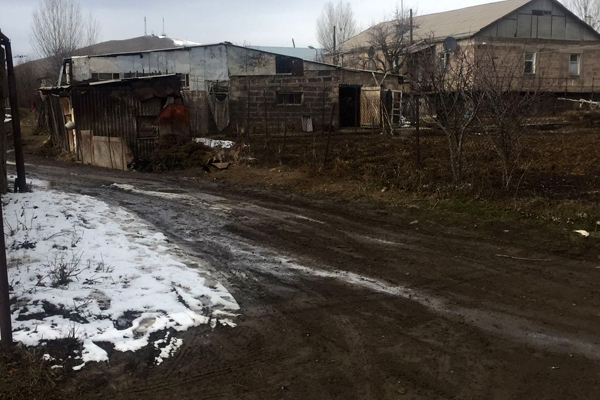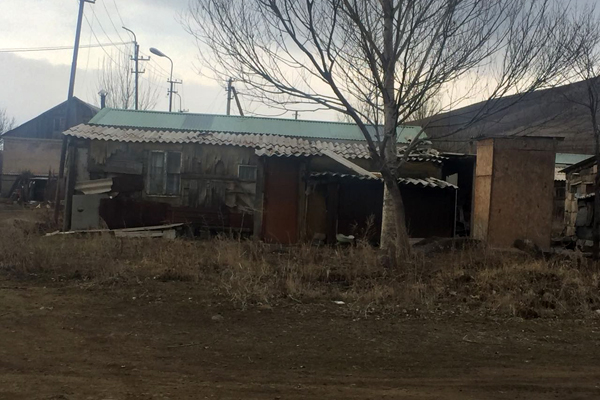“The fish rots from the head,” a middle-aged man from the village of Shirakamut says when we ask for his opinion on the Armenian government’s community enlargement program. “If they want to save money, they should cut government expenses, not lay of employees of village administrations or teachers,” he adds.
Enlargement: Shirakamut
Many in Shirakamut have heard about the enlargement program, but they are not sure whether it will merge all 12 villages along the highway leading from the Spitak tunnel to the Shirak province into a single community, or just 6 of them. They have also heard that Shirakamut is to become the community center, which the locals are, surprisingly enough, not that happy about.
“I know that this might benefit the village: life will become more active, the school might be united and enlarged, and so on. But those living in the other villages are people, too. Khnkoyan, for example, is located 15 kilometers from here and 5 kilometers away from the main highway. The roads are terrible there. If the school closes there and even if there are buses, people will never send their kids to the school here.
“What’s the solution? They’ll leave the village and move to Russia. There’s almost no one left there (289 people, according to official data). After the enlargement this village will no longer exist; they might as well take it off the map,” a Shirakamut villager says.
We enter the village administration; there were about a dozen men gathered in one of the rooms. At first, they don’t trust the journalists from Yerevan. “What outlet are you from? Why did you suddenly decide to come to Shirakamut,” they ask. One of the men gets visibly agitated when he hears about the enlargement program: “They simply want to save some money at the expense of the villagers,” he complains.
While the situation for Shirakamut might change for the better, he explains further, the rest of the villages will suffer greatly, and the harm will be irreparable. “Say, brother: has any reform in this country ever lead to anything good? Have they ever done anything for the people? I do not believe in this program.”
We leave the administration building and continue the conversation on the street. One of the men says: “In addition to what has already been said, there are a couple of other important issues with this program. Firstly. dear journalists, the form of self-government changes. Those villages will be pushed the background. Some of them will get no attention. That’s for sure. Secondly, you are well aware that it becomes easier to manage and control the people. It’s plain centralization. They’ve undertaken this purely for political reasons.”
According to him, the head of the newly enlarged community will be appointed “from the top, because, well, you know how it is during elections.” There is currently not much intervention when it comes to electing village heads, he says, “it’s more of an internal issue.” The enlargement, however, will deprive the villagers of this opportunity.
We visit Shirakamut village head Ashot Yeranosyan at his office. He has been holding the position for 4 months, and our previous interlocutors had spoken positively about him. Yeranosyan is rather careful when answering our questions about the enlargement program. He says that centralizing the budget might lead to positive developments: they will be able to implement more large-scale programs, will receive subventions. Nevertheless, he can not say for sure how the events will develop.
It is our second day the village; we approach a group of men gathered on the street and ask about the enlargement program. They have heard about the initiative but are not very optimistic about it. No one believes in positive changes; there are no jobs, they say, the people’s only hope is to leave for Russia.
“No one needs this enlargement if it does not lead to the creation of any factories and other workplaces. Have they done anything in this direction anywhere? No, they have not. It’s a hopeless business.”
Enlargement: Katnajur
The attitude towards the program is even worse in the neighboring Katnajur village. A group of men are gathered in of the rooms of the village administration, having a conversation, playing checkers and chess. One after another, they present their arguments against the enlargement program: “we get along with the current village head,” “we can easily take care of everyday issues, such as street cleaning or pipe repairing,” “no one will listen to us if the center is moved to another village.”
“Not everyone in villages is able to pay land or water taxes. After the enlargement, we will be forced to provide for the communities which are unable to pay taxes with their own budget,” one of the men argues.
The villagers are convinced that Katnajur will suffer majorly if the enlargement program is carried out, and the people will have no other option but to move out.
One of the interlocutors suddenly asks us: “Enlargement was carried out in Tavush, right? Can you say anything positive about it? Has there been any progress at all? Have you heard anything good from the people there? I don’t think so.”
After a while, the men are able to calm their emotions down and talk about the program with more coolness:
“Our community has been able to take care of some issues with its own budget. We’ve repaired roads; not all of them, but still. If we are merged, however, we might as well forget about ever being able to do anything… I’m 53 years old; I have a loan of 18 000 dollars… Merge us into Azerbaijan if you want to, or Georgia… There’s not going to be much difference for us either way.”
Their protest is accompanied by despair. People do not believe that anything would change; they say that no one ever listens to their opinion anyway:
– You know full well that this is a European Union program. They have taken the European Union money and will go ahead with the implementation without listening to us. You know better than I.
– If there’s one thing I know for sure, it’s that they will never listen to the people. No matter what we say – good or bad – the government will do as they please.
– In short, they want to take away the little land the villagers have left; they want to turn the villagers into their slaves.
Just as we were about the leave, one of the man voiced his final argument against the enlargement program: “If it were a good thing, they’d be talking about non-stop on H1 (Public Television of Armenia).”
 Epress.am News from Armenia
Epress.am News from Armenia


